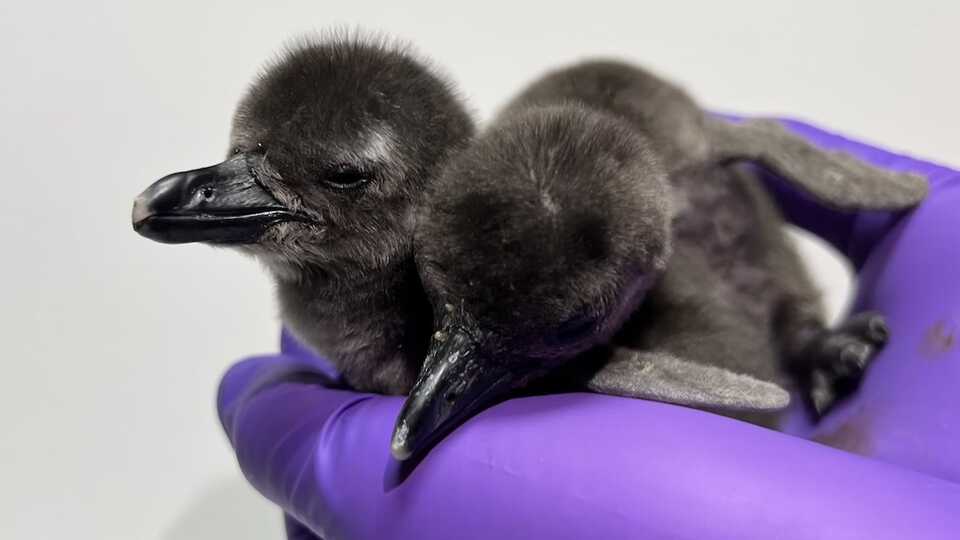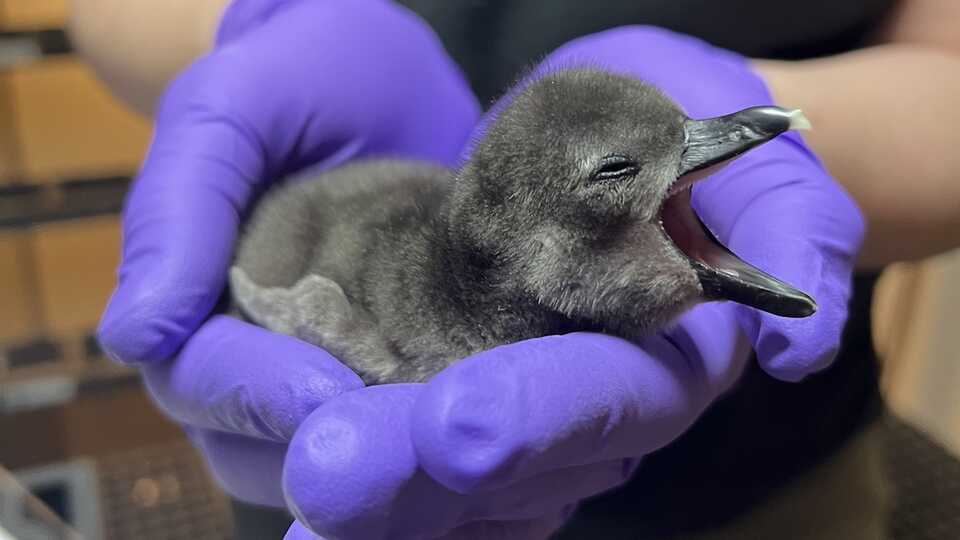First chicks in the colony since 2018 support the Species Survival Plan aimed at sustaining endangered African penguin populations worldwide
SAN FRANCISCO, CA (updated February 8, 2023)— The California Academy of Sciences welcomed two exciting new additions to its African penguin colony on November 1 and December 5, the first new chicks to hatch at the Academy since 2018. Pogo (f), who hatched on November 1, is the first baby for biological parents seven-year-old Bernie (m) and four-year-old Stanlee (f), who was the last penguin to hatch at the Academy. Pogo's name was determined through a social media naming contest in January 2023. The second chick, Oswald "Ozzie" Cobblepot (f), hatched to parents Poppy (f) and Darcy (m), and owes her Batman-inspired name to Academy supporters at the Big Bang Gala.
After a 21-day period spent in their nest boxes with their parents, the chicks will be moved behind the scenes to be cared for by Academy staff, a practice that helps minimize risk to the birds while they are still young and vulnerable.
During their first few months behind the scenes in the aquarium the chicks will attend “fish school,” where all new penguin chicks learn to swim on their own and eat fish given to them by biologists, important life skills they’ll need when joining 14 fellow penguins in the Academy’s bustling colony. Each day at fish school also includes daily enrichment sessions with aquarium biologists to help keep the birds stimulated and engaged. The chicks are expected to join the rest of the Academy’s African penguin colony in early March 2023.
“African penguins have been classified as an endangered species since 2010, and with only about 10,000 breeding pairs left in the wild they face a very real risk of extinction in their natural environment,” says Brenda Melton, Director of Animal Care and Welfare at the Academy’s Steinhart Aquarium. “Visitors to the California Academy of Sciences delight in watching and learning about our beloved colony of African penguins, but what many don’t see is the critical conservation work our team is driving behind the scenes: from participating in a global breeding program aimed at strengthening the genetic makeup of the African penguin population, to field work in South Africa aimed at increasing numbers of the bird in the wild.”
The Academy has a long and successful history of breeding African penguins as part of a Species Survival Plan (SSP), a collaborative breeding and transfer program among partner institutions accredited by the Association of Zoos and Aquariums (AZA) that is dedicated to maintaining genetic diversity in the resident population of African penguins. The penguin parents are SSP recommended breeding pairs, meaning their complementary genetics will help strengthen the African penguin population.
In addition to their work sustaining the resident population of African penguins within zoos and aquariums, Academy biologists also further this critical sustainability work in the field in partnership with the Southern African Foundation For The Conservation Of Coastal Birds (SANCCOB). In late October and early November, Academy biologists Spencer Rennerfeldt and Sparks Perkins traveled to South Africa to support SANCCOB’s Chick Bolstering Project, in which biologists, rangers, and rescue teams collect and hand-rear abandoned eggs and chicks and prepare them for release back into their environment. While in South Africa, Academy biologists cared for approximately 120 birds each day, with over 300 chicks being brought in for care so far this season and more expected in the coming weeks. The main cause of abandonment this year is early molting in adults, which impedes their ability to swim and forage for fish to feed their chicks.
The avian influenza outbreak continues to challenge bird populations worldwide, and Cape Town’s Boulders Beach, after which the Academy’s African penguin habitat is modeled, has been particularly hard hit with the disease this year. The hundreds of young rescued penguins will spend the next few months undergoing rehabilitation at SANCCOB’s Seabird Hospital in Cape Town, and will eventually be released back into the wild.
Photos of the penguin chicks are available here, and press will be welcomed on a request-by-request basis for photos/videos of the chicks.
While the babies won’t be on view until they join the rest of the colony in March, viewers can keep up with the rest of the Academy’s African penguin colony via the live HD Penguin Cam, where feedings are broadcast twice daily at 10:30 am and 3 pm (PT).
The California Academy of Sciences is a renowned scientific and educational institution with a mission to regenerate the natural world through science, learning, and collaboration. Based in San Francisco’s Golden Gate Park, it is home to a world-class aquarium, planetarium, and natural history museum, as well as innovative programs in biodiversity science, environmental learning, and collaborative engagement—all under one living roof. Museum hours are 9:30 am – 5:00 pm Monday – Saturday, and 11:00 am – 5:00 pm on Sunday. Admission includes all exhibits, programs, and shows. For daily ticket prices, please visit www.calacademy.org or call (415) 379-8000 for more information
Press Contacts
If you are a journalist and would like to receive Academy press releases please contact press@calacademy.org.
Digital Assets
Hi-res and low-res image downloads are available for editorial use. Contact us at press@calacademy.org to request access.

